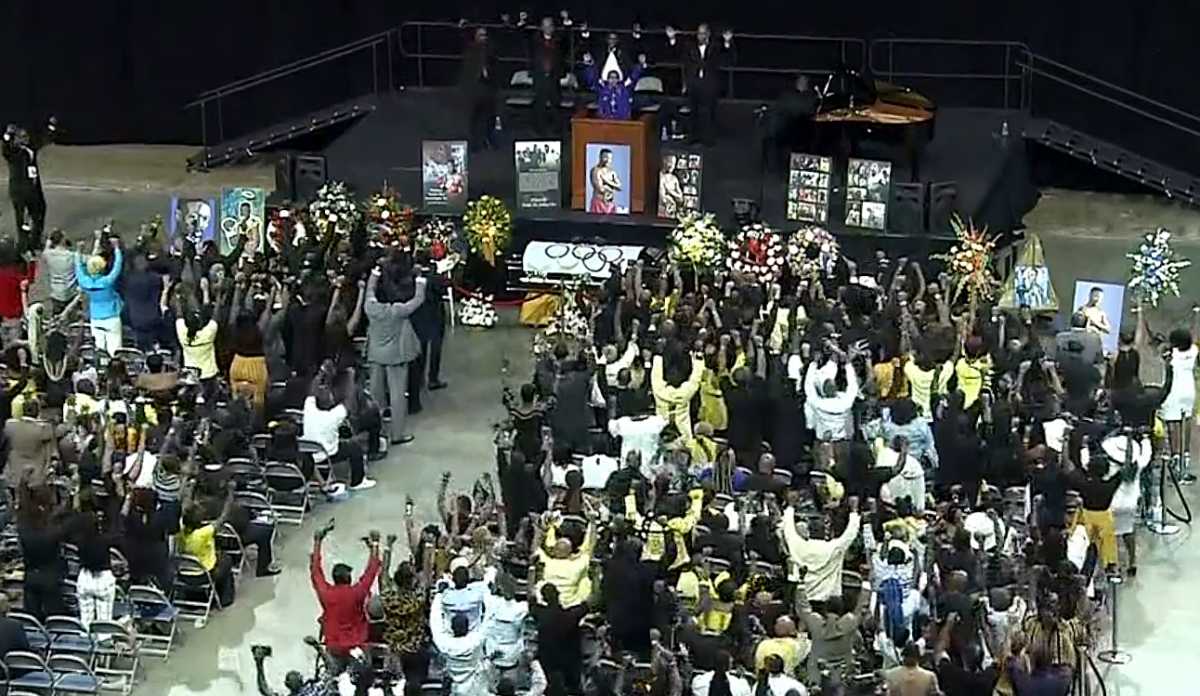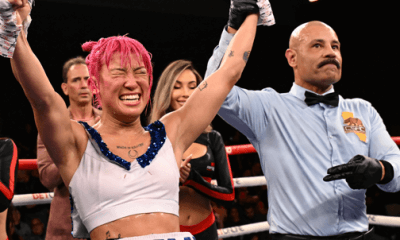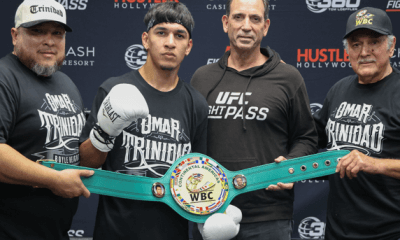Featured Articles
Good Night, Sweet Pea

Good Night, Sweet Pea
Bishop James E. Jones Jr.’s booming baritone was rising up through the rafters at the Scope Arena in Norfolk, Virginia. He was preaching about hands—your neighbor’s hands, the hand in yours now, the Father’s hands into which Jesus commended his spirit from the cross. “Sweet Pea’s HANDS,” he shouted, “took him to places HIS EYES NEVER IMAGINED!”
Pernell “Sweet Pea” Whitaker, the greatest pure boxer since Willie Pep, lay in repose at the foot of the stage, his hands crossed at his belt. His coffin was black. An Olympic flag was draped over it and boxing gloves carefully arranged on top. The few thousand who attended his Saturday morning memorial service came to mourn and to celebrate a perfect fighter, an imperfect man, and a community that has long-since learned to look up no matter what.
Mark Breland was there. He came down from New York to honor the captain of an Olympic boxing team that won nine gold medals in 1984. Long gone is the fresh-faced amateur smiling under a laurel wreath, but Breland remains reed thin. He stood at the podium in a gray suit with a powder blue shirt and was too overwhelmed with grief to say much. “We knew him differently,” he said.
Kathy Duva, now a promoter, then his publicist, was there too. “Pound-for-pound,” she said. “That’s how he signed his autographs.” And that’s exactly what he was: the pound-for-pound best boxer in the world from September 1993 through March 1996, despite performances that struck the unsophisticated as pusillanimous. “He simply chose not to engage in outright brutality,” Duva said. “It was so much more fun to tease and toy with his opponents.” Whitaker teased and toyed with everyone, including a young Floyd Mayweather Jr. who, she said, “could not lay a glove on him” even as he sparred with those hands of his behind his back in 1996. Whitaker brought laughter into the midst of danger because of his cosmic level of skill, and because it kept boredom at bay. Merely making world-class fighters miss wasn’t enough; so he’d dart behind them and as they looked around to see where he went, he’d tap them on the rear end. When Roger Mayweather was known as “Black Mamba” and feared for his right hand, Whitaker—fighting here at the Norfolk Scope—yanked his trunks down in the middle of the sixth round.
“An imp with gold teeth,” said one wit during his glory days, “floating around that blue canvas like a cloud,” added Duva.
No one could outbox him. It isn’t easy to settle firmly on a lightweight in history who could. But the product of Young Park, a housing project just east of the Scope, wasn’t raised to shrink from violence. As a child, his father wouldn’t tolerate tears when he was hurt by neighborhood bullies. He’d turn him around. “Go back,” he’d say. “Give them everything you got.” When he was eight, he and nine-year-old Mario Cuffee got into a street fight and Clyde Taylor, a mailman who moonlighted as the neighborhood’s recreation director, hustled over and grabbed both by the scruff of the neck. “Do your fighting in the gym,” he said, and with permission from the boys’ parents, restaged the fight in the ring, with boxing gloves that looked like balloons. Whitaker lost that one, but found a mentor who began the process of transforming an undersized project kid into a giant of boxing and boxing history. Whitaker credited Cuffee almost as much. “Come to think of it,” Cuffee told me Monday, “I beat him that first fight, though I gotta come clean, he got me back a few years later.” When Whitaker fought Greg Haugen at the Coliseum in 1989, Cuffee bought a ticket and made his way across the Hampton Roads Beltway through a blizzard to see Haugen lose every round. At the post-fight press conference, Cuffee was standing in the back, “in cognito.” Whitaker spotted him and told the story of their fateful childhood fight. “Thanks Mario,” he said. Haugen, his face scuffed and swollen, looked up. “Yeah,” he said. “Thanks Mario.”
In Detroit, while still an amateur, he was invited to spar with Hector Camacho just as Floyd Mayweather was later invited to spar with him. Camacho couldn’t land a glove on him either. “He got mad and started fighting dirty,” Whitaker told the Newport News. “He grabbed me behind the head, pulled it down, and hit me with an uppercut. Then I grabbed him and threw him to the canvas and we started wrestling and fell out of the ring.” Whitaker offered to take it outside. Camacho talked a lot but never went near him again.
In 1984, after the Duvas had convinced Whitaker to throw in with Main Events, they introduced him to trainer George Benton. Benton, who understood the science of belligerent invisibility like no one else, took what Taylor had begun and finished it. He taught him to stop running around the ring, to stand on a dime; to see the difference between wasting energy and ducking and slipping just enough to let punches graze your hair or flick your ear. Benton made sure he became, in his words, “harder to hit than the numbers,” and a master at punching around, between, over, and under what’s coming in. “When I talk he stands and listens like a private would a general,” he said in 1986. “Sweet Pea’s going to be one of the best fighters ever.”
Seven years later, Whitaker swaggered into the ring against Julio Cesar Chavez, then 87-0 and rated by The Ring as the best pound-for-pound fighter in the world. Whitaker fought him on a dime—twisting, rolling, fast-stepping outside his lead foot, and punching around, between, over, and under whatever came in. He had a trick that kept working. He’d turn his right shoulder in to narrow himself and hide his left until the moment it clubbed Chavez on the side of the head. You could hear it land—“whump!”—and it landed all night. In the ninth round, he was outfighting Chavez on the inside—“whump, whump!”—which no one had ever done. Chavez was befuddled and —“whump!”—puffing up. And then, at the end, 59,000 witnessed one of boxing history’s most egregious heists. Two of the three judges called the fight a draw. That’s what we were told anyway. Josè Sulaimàn, WBC president, countryman of Chavez, and favorite stooge of Don King, was seen collecting the scorecards after every round that night.
It is a grandiose irony. Whitaker put an exclamation point on Benton’s prediction in two fights he didn’t win. The second one was nearly as bad as the first.
At 33, he faced a 24-year-old Oscar De La Hoya, then 23-0 and rated by The Ring as the second best pound-for-pound fighter behind Roy Jones Jr. Whitaker made him look like a golem and won that fight too despite an official loss that stinks to this day. “The world saw it,” he said afterward, and smiled anyway, gold teeth gleaming. “The people saw it.”
Bishop Jones saw it. He remembered him standing triumphantly on the ropes before the decision against him was announced. He remembered it well.
“What I loved most about Sweet Pea Whitaker,” he told the mourners at the Norfolk Scope,
“.…was when he KNEW he had won the fight he DIDN’T WAIT on the referee to hold up his hands. He didn’t WAIT on the THE JUDGES to tell him whether or not he had won the fight, but if you look on the back of your programs, there’s a SIGNATURE MOVE that the champ would always do when he knew he had WON THE FIGHT. Family! HE WOULD THROW UP BOTH HIS HANDS!”
With that, Jones stepped back from the podium and thrust both hands in the air. When the people saw that, they roared as one. But Jones was just getting started, the crescendo wasn’t reached, not yet. He stopped them short. “EXODUS CHAPTER SEVENTEEN, VERSE ELEVEN! Whenever Moses held up…” and stepping back again, struck the same pose, “…HIS HANDS the people always had the victory…if the champ could hold up his hands in the middle of his fight, then SURELY you and I ought to HOLD UP OUR HANDS!”
Mario Cuffee jumped to his feet and thrust both hands in the air. Thousands, dressed in their best on the hottest day yet this year, rose as one and thrust both hands in the air. Whitaker’s signature move, multiplied. It was a transcendent moment; the spirit of a man—a father, a brother, a friend, a neighbor—merging with the spirit of the city he loved.
Bishop Jones lowered his gaze to the black coffin at the center of it all. “SWEET PEA!” he thundered as if to wake him up, “That one is for you! You got the victory! CHAMP!”
I closed my eyes and somewhere, I know, Whitaker opened his.
“—YOU GOT THE VICTORY!”
___________________
Special thanks to Dr. James E. Jones Jr. senior pastor and founder of Greater Grace Church in Portsmouth, VA.
Springs Toledo is the author of Smokestack Lightning: Harry Greb, 1919, now available in paperback.
Check out more boxing news on video at The Boxing Channel
To comment on this story in The Fight Forum CLICK HERE
Editor’s Note: SMOKESTACK LIGHTNING: HARRY GREB, 1919, originally released as an eBook, is now available in PAPERBACK at AMAZON for $13.99. Check out the trailer on youtube:
-

 Featured Articles3 weeks ago
Featured Articles3 weeks agoThe Hauser Report: Zayas-Garcia, Pacquiao, Usyk, and the NYSAC
-

 Featured Articles2 weeks ago
Featured Articles2 weeks agoOscar Duarte and Regis Prograis Prevail on an Action-Packed Fight Card in Chicago
-

 Featured Articles1 week ago
Featured Articles1 week agoThe Hauser Report: Cinematic and Literary Notes
-

 Book Review5 days ago
Book Review5 days agoMark Kriegel’s New Book About Mike Tyson is a Must-Read
-

 Featured Articles4 weeks ago
Featured Articles4 weeks agoManny Pacquiao and Mario Barrios Fight to a Draw; Fundora stops Tim Tszyu
-

 Featured Articles4 weeks ago
Featured Articles4 weeks agoArne’s Almanac: Pacquiao-Barrios Redux
-

 Featured Articles3 weeks ago
Featured Articles3 weeks agoRemembering Dwight Muhammad Qawi (1953-2025) and his Triumphant Return to Prison
-

 Featured Articles4 weeks ago
Featured Articles4 weeks agoOleksandr Usyk Continues to Amaze; KOs Daniel Dubois in 5 One-Sided Rounds


















